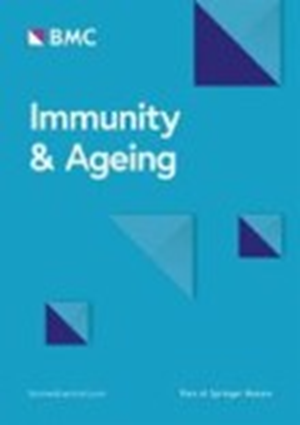住院的 COVID-19 老年患者血液中的循环细菌 DNA
IF 5.2
2区 医学
Q1 GERIATRICS & GERONTOLOGY
引用次数: 0
摘要
冠状病毒病 COVID-19 是由 SARS-CoV-2 感染引起的一种异质性疾病。一般来说,它以间质性肺炎为特征,可导致气体交换受损、急性呼吸衰竭和死亡,但也有多器官功能障碍的复杂疾病的描述。该病的发病机制十分复杂,在重症患者中,各种因素的组合也不尽相同。COVID-19 对老年人,尤其是体弱和合并症患者的风险特别大。本研究旨在确定血液细菌 DNA(BB-DNA)与老年 COVID-19 患者临床严重程度之间的关系。本研究通过针对 16S rRNA 基因的定量实时 PCR 检测了 149 名住院老年 COVID-19 患者(年龄在 65-99 岁之间)的 BB-DNA 水平。同时还评估了临床数据,包括感染症状和体征、虚弱状态和合并症。与出院患者相比,死亡患者的 BB-DNA 增加,Cox 回归分析证实 BB-DNA 与院内死亡率有关。此外,BB-DNA 与中性粒细胞计数呈正相关,与血浆 IFN-α 呈负相关。此外,BB-DNA 还与糖尿病有关。BB-DNA与COVID-19住院病人的死亡率、免疫炎症参数和糖尿病的关系表明,BB-DNA有可能成为该疾病不良后果的生物标志物,因此可将其作为评估急性COVID-19疾病的新型预后标志物。本文章由计算机程序翻译,如有差异,请以英文原文为准。
Blood circulating bacterial DNA in hospitalized old COVID-19 patients
Coronavirus disease COVID-19 is a heterogeneous condition caused by SARS-CoV-2 infection. Generally, it is characterized by interstitial pneumonia that can lead to impaired gas-exchange, acute respiratory failure, and death, although a complex disorder of multi-organ dysfunction has also been described. The pathogenesis is complex, and a variable combination of factors has been described in critically ill patients. COVID-19 is a particular risk for older persons, particularly those with frailty and comorbidities. Blood bacterial DNA has been reported in both physiological and pathological conditions and has been associated with some haematological and laboratory parameters but, to date, no study has characterized it in hospitalized old COVID-19 patients The present study aimed to establish an association between blood bacterial DNA (BB-DNA) and clinical severity in old COVID-19 patients. BB-DNA levels were determined, by quantitative real-time PCRs targeting the 16S rRNA gene, in 149 hospitalized older patients (age range 65–99 years) with COVID-19. Clinical data, including symptoms and signs of infection, frailty status, and comorbidities, were assessed. BB-DNA was increased in deceased patients compared to discharged ones, and Cox regression analysis confirmed an association between BB-DNA and in-hospital mortality. Furthermore, BB-DNA was positively associated with the neutrophil count and negatively associated with plasma IFN-alpha. Additionally, BB-DNA was associated with diabetes. The association of BB-DNA with mortality, immune-inflammatory parameters and diabetes in hospitalized COVID-19 patients suggests its potential role as a biomarker of unfavourable outcomes of the disease, thus it could be proposed as a novel prognostic marker in the assessment of acute COVID-19 disease.
求助全文
通过发布文献求助,成功后即可免费获取论文全文。
去求助
来源期刊

Immunity & Ageing
GERIATRICS & GERONTOLOGY-IMMUNOLOGY
CiteScore
10.20
自引率
3.80%
发文量
55
期刊介绍:
Immunity & Ageing is a specialist open access journal that was first published in 2004. The journal focuses on the impact of ageing on immune systems, the influence of aged immune systems on organismal well-being and longevity, age-associated diseases with immune etiology, and potential immune interventions to increase health span. All articles published in Immunity & Ageing are indexed in the following databases: Biological Abstracts, BIOSIS, CAS, Citebase, DOAJ, Embase, Google Scholar, Journal Citation Reports/Science Edition, OAIster, PubMed, PubMed Central, Science Citation Index Expanded, SCImago, Scopus, SOCOLAR, and Zetoc.
 求助内容:
求助内容: 应助结果提醒方式:
应助结果提醒方式:


